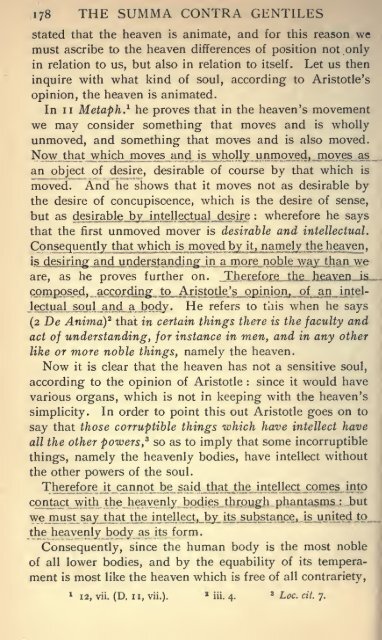summa-contra-gentiles
Summa
Summa
You also want an ePaper? Increase the reach of your titles
YUMPU automatically turns print PDFs into web optimized ePapers that Google loves.
178 THE SUMMA CONTRA GENTILES<br />
stated that the heaven is animate, and for this reason we<br />
must ascribe to the heaven differences of position not only<br />
Let us then<br />
in relation to us, but also in relation to itself.<br />
inquire with what kind of soul, according to Aristotle's<br />
opinion, the heaven is animated.<br />
In II Metaph.^ he proves that in the heaven's movement<br />
we may consider something that moves and is wholly<br />
unmoved, and something that moves and is also moved.<br />
Now that which moves and is<br />
wholly unmoved, moves as^<br />
an object of desire, desirable of course by that which is<br />
moved. And he shows that it moves not as desirable by<br />
the desire of concupiscence, which is the desire of sense,<br />
but as desirable by intellectjual desire : wherefore he says<br />
that the first unmoved mover is desirable and intellectual.<br />
Consequently tlmt wiikhj^ moy^^ by it, namely the heaven,<br />
is desiring and understanding in a more noble way than we<br />
are, as he proves further on. Therefore the heaven is ,,<br />
cprnposed, according. to_ Aristotle 'so of an intel-<br />
Jeclual soul and a body. He refers to this when he says<br />
(2 De AnimaY that in certain things there is the faculty and<br />
act of understanding, for instance in men, and in any other<br />
like or more noble things,<br />
namely the heaven.<br />
Now it is clear that the heaven has not a sensitive soul,<br />
according to the opinion of Aristotle : since it would have<br />
various organs, which is not in keeping with the heaven's<br />
simplicity. In order to point this out Aristotle goes on to<br />
say that those corruptible things which have intellect have<br />
all the other powers,^ so as to imply that some incorruptible<br />
things, namely the heavenly bodies, have intellect without<br />
the other powers of the soul.<br />
Therefore it cannot be said that the intellect comes into<br />
contact with the heavenly bodies. throiigh phantasms: but<br />
wemust sayjhat the intellectj^_b)^ks^ub_stance, is united to<br />
the heavenly body as its form.<br />
the most noble<br />
Consequently, since the human body is<br />
of all lower bodies, and by the equability of its<br />
temperament<br />
is most like the heaven which is free of all <strong>contra</strong>riety,<br />
1<br />
12, vii. (D. II, vii.).<br />
« iii. 4.<br />
' Loc. cii. 7.


















